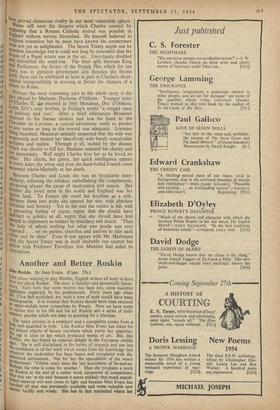Another and Better Ruskin
401111 Ruskin. By Joan Evans. (Cape. 25s.) their actors wanting to play Hamlet, English writers all want to have sitt..ir say about Ruskin. The story is familiar and perennially fascin- litnt%. Each tOels that some nuance has been lost, some essential ingredient neglected, by his predecessors. Forty years ago when , Clive Bell published Art, such a turn of taste would have been Unimaginable. It is ironical that Ruskin should have been restored upper-middle brow sympathies by Proust. Now we have come '0 realise that in his life and his art Ruskin sets a series of rudi- kentary puzzles which can keep us guessing for a life-time.
The latest attempt at a summary and a conspettus comes from a rdY well qualified to help. Like Ruskin Miss Evans has taken' for her subject objects of beauty anywhere which excite her appetites. Ruskin, age is alien to her which produced works of art. But, like ItUskin, she has found an especial delight in the European middle ages. She is well disciplined in fir. habits of research and one has '",e Confidence in all her work which comes from the knowledge that Whatever she undertakes has been begun and completed with dis- interested enthusiasm. Not for her the speculation of the weary professional : 'Fifteen years since the last assessment of So-and-so. Perhaps the time is come for another.' Thus she produces a work of Ruskin at the end of a rather brisk succession of competitors..., ,.ne may say 'at the end' because it seems unlikely that much unpub- ;!shed material will now come to light and because Miss Evans has handled all that was previously available and some valuable new flatter lucidly and wisely. She has In fact succeeded where her predecessors have just failed and produced what should for all general purposes prove to be the standard brief life.
Miss Evans's claim to this title, besides her own personal distinc- tion, is her position as joint editor with Mr. J. Howard Whitehouse of Ruskin's diaries which are to appear next year from the Clarendon Press. She has drawn liberally on this exciting new source particularly from the middle, crucial years of Ruskin's Life. It is revealing particularly in showing the egotism of the subject. Because he was munificent and without personal gross ambitions, he has acquired a reputation for generosity and selflessness which, it is a shock to discover, was little deserved.
This is the stage in a review when the reviewer is tempted to leave his proper subject and begin an essay of his own. This would be rho service to reader or author. Perhaps a few notes are permissible on what, in reading Ruskin's story once more, immediately impresses. First, as mentioned above, Ruskin's selfishness. Then his precocity; the first volume of Modern Painters was written when he was twenty- three; that work was finished, the Stones of Venice and the Seven Lamps begun and ended, in the next ten years. His chief life-work was then accomplished by the age of thirty-three. That would not be remarkable in a poet and, in truth, Ruskin was a poet, pure and simple. His ickas were mostly preposterous and inconsistent. As a thinker, aesthetically, politically or theologically, there is an awful frivolity about him—as there was, indeed, about Tennyson. He was gifted with a superb organ-voice which ennobled everything he said. It is not that he had a trick of making the fatuous impressive, but that the fatuous became filled with his own genius.
Of recent years a slightly prurient importance has been attached to the failure of Ruskin's marriage and of his subsequent romantic aspirations. Miss Evans tactfully and firmly sets these incidents in their proper place. She is interested in him primarily as an artist. She has studied his written work with an attention not given to it, perhaps, by any of his recent biographers. He never, it seems, held an intellectual conviction. He was all sensibility. He was brilliantly devoid of snobbery, ingenuously, ignorant so that he came • fresh to anything ready to be swept up or rebuffed by the mood of the moment, quite content to join Tintoretto and Mulrcady and Kate Greenaway in the same circle of felicity, stubbing his toe hard when he came on Catholicism or Marxism or any of the solid ele- ments of his century, so confident in hii discordant judgements that intellectual disintegration was inevitable.
Again the fever of writing about Ruskin has taken hold of the reviewer. Let him end strictly by repeating that Miss Evans's study is the most complete and trustworthy that has yet appeared or is likely to appear for the convenience of the 'general reader.'
EVELYN WAUGH



































 Previous page
Previous page